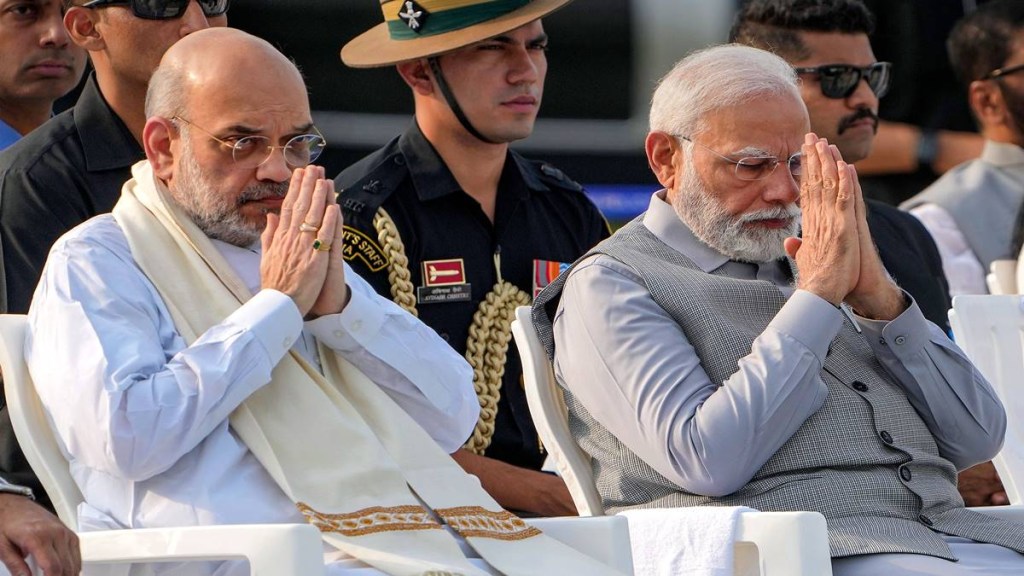On the face of it, the Bharatiya Janata Party is an upbeat lot. The conversations within the party are largely centred around the possible chief ministerial picks in Rajasthan, Madhya Pradesh and Chhattisgarh or how the Lok Sabha elections in 2024 are a done deal. The party has projected the three victories in the Hindi heartland as a stamp of approval by the people for Prime Minister Narendra Modi’s leadership and a reality check for Congress ahead of the Lok Sabha elections 2024.
However, behind the euphoria, lies the devil in the detail – one that should leave the BJP’s top leadership — Prime Minister Narendra Modi and key strategist Amit Shah — with an enormous task at hand. For, a closer look at the numbers behind what some are terming as a ‘feeble’ win reveals the multiple pain points that exist for the BJP, regardless of the win.
For all the hullabaloo over the BJP’s remarkable sweep of the heartland, numbers show that the margin of victory between the BJP and Congress in Rajasthan was too close for comfort. The BJP’s vote share in the 2018 elections, when the party lost power in the state and won 73 of the 200 seats, stood at 38.08 per cent. The Congress, on the other hand, with 101 seats, polled 39.3 per cent of the total votes. The Congress, which came to power by a wafer-thin majority with Independents, gained 6 per cent in vote share while the BJP lost around 6.4 per cent of the votes polled in its favour in 2018.
Cut to 2023 and the party’s win in 115 of the 199 seats is backed by a vote share of 41.69 per cent, while the Congress not only maintained its vote share but managed to build on it. As per the Election Commission data, the Congress received 39.53 per cent of the total votes, an increase of 0.23 per cent, but still ended up on the losing side. Unlike the Congress’ win in the 2018 elections, where its vote share grew by over 4 per cent, the BJP’s victory is marked by an increase of 3.61 per cent.
Also Read: Vasundhara Raje, Gajendra Shekhawat to Baba Balaknath – Meet the CM probables in Rajasthan
The problems for BJP do not end here. A closer look at the data shows that contrary to the Congress’s 2018 victory where it gained 6 per cent at the cost of BJP’s drop of 6.4 per cent in vote share, the BJP gained 3.6 per cent, but not at the cost of Congress whose vote share has only grown. Instead, the BJP’s gains come from the losses suffered by parties like the Bahujan Samaj Party which garnered 1.82 per cent votes as compared to 4.03 per cent in 2018.
The swing in vote share is alarming for the BJP for two reasons. First, it does not come at the cost of Congress and second, it portrays the Congress as a more resilient party in the state despite its losses. Elections in Rajasthan have largely been a bipolar affair between the BJP and Congress, with one side gaining at the cost of the other. This election changed that trend, implying that Congress has managed to hold on to its strongholds despite an overall sentiment in favour of the BJP.
Also Read: Rajasthan Results 2023: Ashok Gehlot resigns as Chief Minister after poll rout
An analysis shows that of the 28 seats that the BJP won in 2008, 2013 and 2018, the BJP lost 9 this time with the Congress winning eight of them. The Congress, on the other hand, has 5 seats where it has traditionally been strong. In the 2023 elections, it lost just one of them — to an Independent.
What compounds the worry for the BJP is the Congress’ growth in terms of popular votes despite being ridden by factionalism and a very ugly public scuttle between Chief Minister Ashok Gehlot and his former deputy Sachin Pilot. While the BJP too had its own leadership problems — it contested the elections without a CM face and had to depend on its star campaigners to do the drudgery — the Congress still managed to pull through in terms of vote share.
While these concerns remain in the state, the Lok Sabha elections have always been a different ball game. The BJP draws a majority of its strength from the Hindi heartland in Lok Sabha elections, with Rajasthan having backed Prime Minister Narendra Modi in all past elections. The trends in the Assembly polls, however, make it evident that the party will bank heavily on PM Modi’s popularity and the party’s well-oiled poll machinery to see it through once again.

